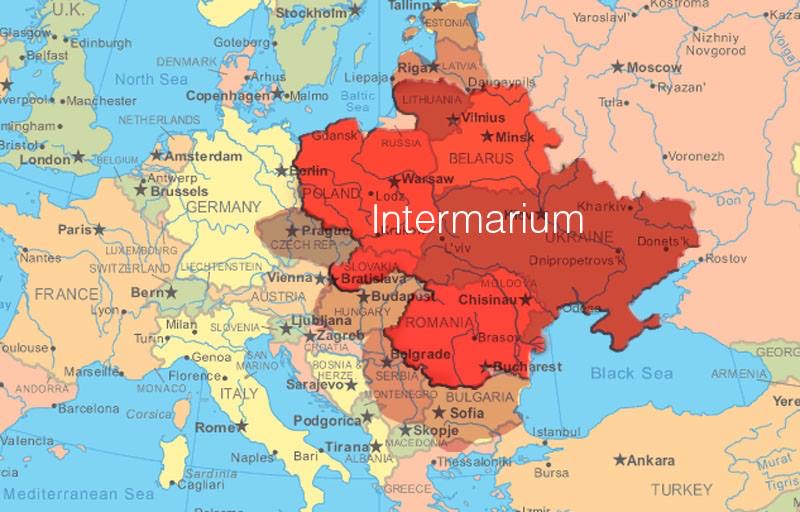THE INTERMARIUM - A BRIEF HISTORY

The Intermarium corresponds more or less to the old territory of the Polish-Lithuanian Commonwealth, and also to the territory identified by the English geopolitical theorist Halford Mackinder writing in 1919 as the 'middle tier of Eastern Europe', which could be used by British interests against either or both Germany and Russia. (35) The idea of an 'Eastern European League of Nations' - Belarus, Ukraine and Romania in a military and political confederation with Poland, Finland and the Baltic states - was put forward by Josef Piłsudski when he became the first head of state of the post-war independent Poland, 1918-22, resulting in March 1922 in a 'Warsaw contract', though this was never ratified. Although the Ukrainian Military Organisation, which was to become the Organisation of Ukrainian Nationalists, had been formed in 1920 as a Galician opposition to being incorporated into Poland, Simon Petliura and his Ukrainian Democratic Republic in Exile - representing the more Eastern Territories eventually incorporated into the Soviet Union - was in alliance with Piłsudski.
(35) Halford J. Mackinder, Democratic Ideals and Reality. A Study in the Politics of Reconstruction, London: Constable and Co, 1919. This account of the Intermarium is taken almost entirely from Marlene Laruelle and Ellen Rivera: 'Imagined Geographies of Central and Eastern Europe. The Concept of Intermarium', IERES Occasional Papers, no. 1, March, 2019 Transnational History of the Far Right Series - obtained off the internet at https://www.illiberalism.org/imagined-geographies-of-central-and-eastern-europe-the-concept-of-intermarium/, so unpaginated. Marlene Laruelle has also written on Dugin. 'Illiberalism' as the name suggests, specialises in studying anti-liberal political tendencies. Adrien Nonjon also writes for it. Laruelle and Nonjon are distinguished among anti-liberal writers by what appears to be a genuine interest in the ideas they are discussing.
Laruelle gives a quite fascinating account of the ways in which the Intermarium idea was used by a succession of anti-Communist bodies backed by British and American intelligence agencies - the Central European Federal Club (established in Britain in 1940), the Congress of Delegates of Oppressed European Nations (1946, convoked by the Scottish League for European Freedom), the rival US controlled Continental Union, the Anti-Bolshevik Bloc of Nations (ABN, founded in 1946 with British, US and German support , which brought many old Fascists groupings under its umbrella). Then, more recently, after the fall of the Soviet Union, the idea was revived by George Friedman, the Hungarian founder of the strategic studies think-tank Stratfor; and also by the Institute of World Politics, founded in 1990, where the Intermarium was advocated by the Polish-American Marek Jan Chodakiewicz, Director of the Centre for Intermarium Studies.
In 2015, the Polish President, Andrzej Duda, announced a 'Three Seas Initiative', the three seas being the Black Sea, the Baltic and the Adriatic, supported by the US-based Atlantic Council in a publication co-authored by the Atlantic Council Chairman, former Supreme Commander of NATO, General James L. Jones and Pawel Olechnowicz, CEO of the Polish Oil and Gas giant Grupa Lotos.
Laruelle sees a connection between these very pro-Western Intermarium initiatives and the Ukrainian development through Yaroslava Stetsko (1920-2003) who succeeded her husband Yaroslav Stetsko at the head of the ABN when he died in 1986. Yaroslav Stetsko had been the leader of the Bandera wing of the OUN who had marched into Lviv in June 1941 and had displeased the Germans by immediately declaring Ukrainian independence. She gives an account of Viktor Yuschenko's rehabilitation of the OUN, incidentally telling us that Yuschenko's wife, Katerina Churnachenko, had been a special assistant in the US State Department and in 1988-9 in the Office of Public Liaison in the White House. Nonetheless, I don't think she really establishes a link between this very atlanticist line of development and the (at least theoretically) anti-atlanticist Intermarium Support Group launched in July 2016 by Biletsky and Semenyaka. Yaroslav Stetsko’s private secretary, the U.S. born Roman Zvarych, was briefly head of staff of the Central Committee of Azov but the source Laruelle gives for this is an interview with Biletsky in which he is quite dismissive of the connection: 'I think that we gave Roman and Svitlana Zvarych more of the necessary acquaintances than they gave us.' (36)
(36) 'Andriy Biletskyi: Avakov is a system man, and I consider this system extremely negative', Ukrainian Pravda, 18th October, 2016. https://pda.pravda.com.ua/articles/id_7123983/ (machine translation)